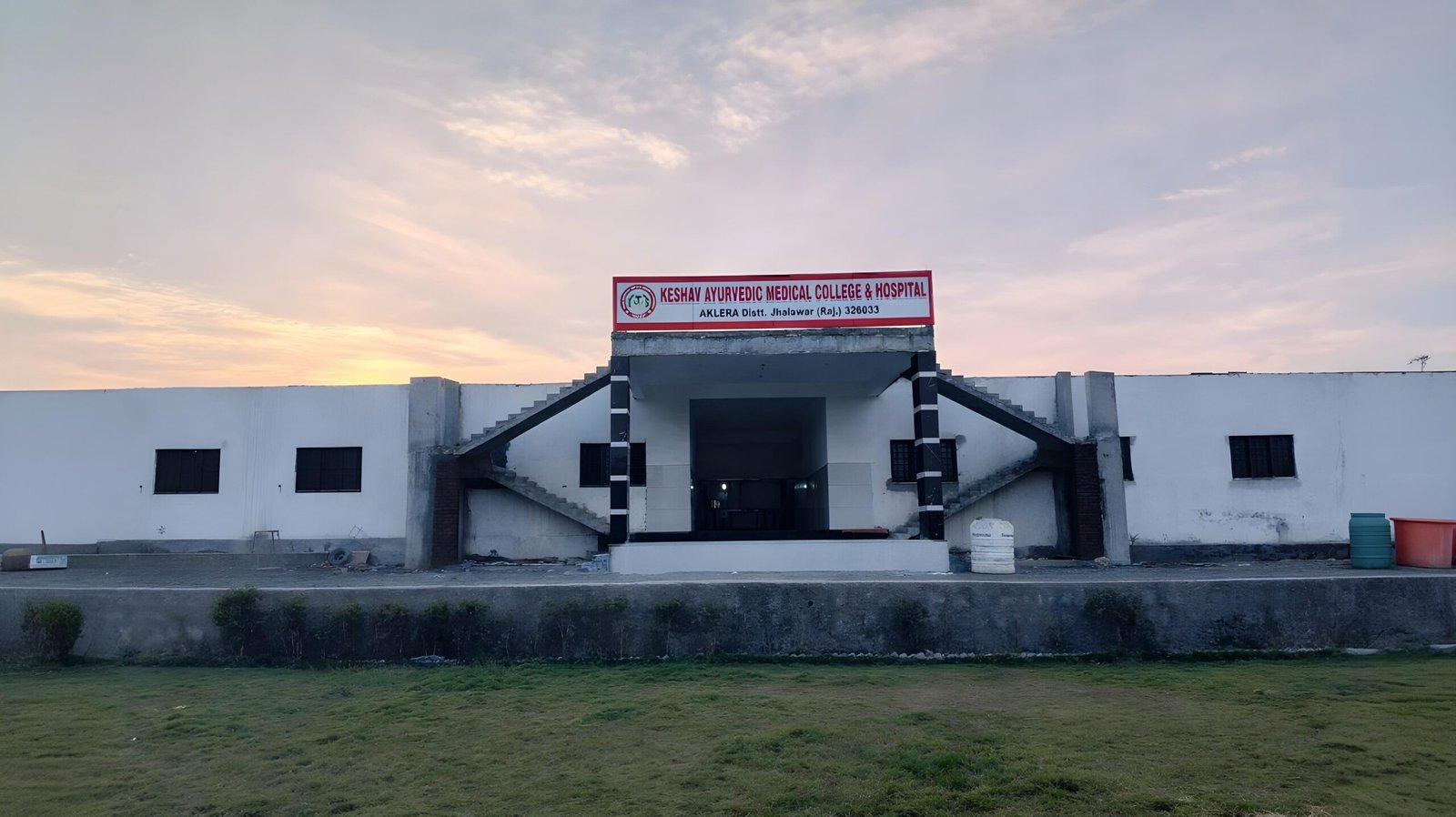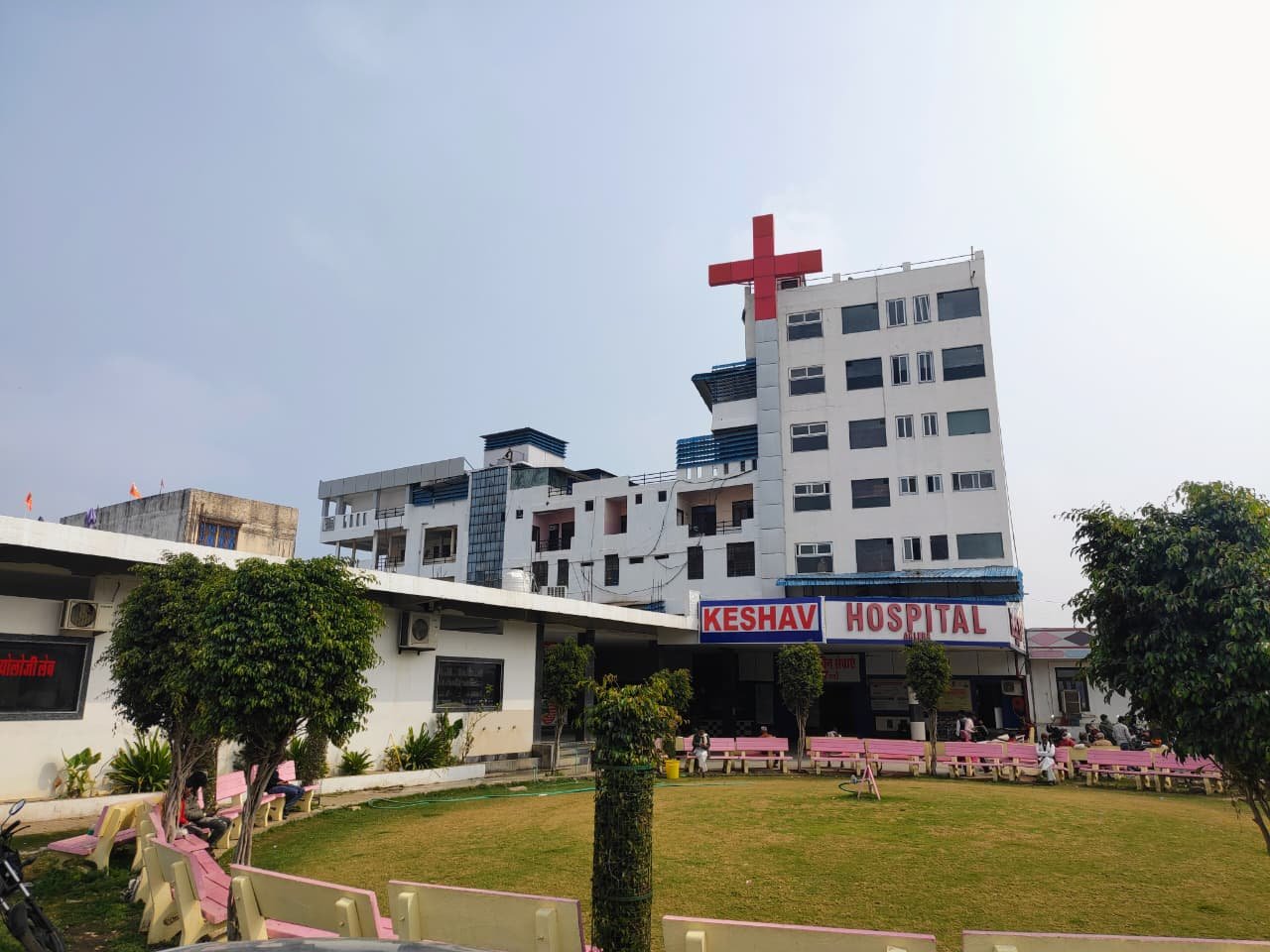College
Keshav Ayurvedic Medical College and Hospital the aim of restoring the ancient system of medicine means ayurveda in the present system of health and to make it a recognized and distinguished path in society.Keshav Ayurvedic Medical College and Hospital would fill this gap and will be instrumental in attracting foreign patients for Ayurvedic treatment of such chronic health problems, which do not find solutions in other medical systems. The Institute is expected to help  boost medical tourism in the Hadoti region of Rajasthan and showcasing strengths of Ayurved.
boost medical tourism in the Hadoti region of Rajasthan and showcasing strengths of Ayurved.
This Institution was established in the year 2019 and affiliated to Dr. S.R. Rajasthan Ayurved University, Jodhpur, recognised by CCIM (Central Council of Indian Medicine) and Ministry of AYUSH, Government of India.
In this competitive era, we are busy in our efforts to adorn our present infrastructure with all the modern technological requirements so as to prove the effectiveness of Ayurved through research oriented work. Not only we have an plenty space for teaching and hospital but we have well defined spacious herbal garden where more than 200 medicinal plants are making the nearby environment healthy and nurturing the thoughts in our mind that herbal medicines to retain their effectiveness in curing common to rarest of ailments and Improving the quality of higher education in Ayurved.
The College is situated in a campus which is 3 kms away from Aklera. KAMCH campus at Aklera is as exciting as it is disciplined and organized. Regularly encouraged cultural events and quality standards of sports facilities make for an interesting stay for students throughout their course. Library facility, Lush green campus, Yoga Hall, Prayer Hall, eco-friendly pleasant ambience with an air of healing herbs. It is a well secured place monitored by experienced staff residing in the campus and available for academic interaction. It has spacious building with sufficient number of class rooms as stipulated norms by apex body CCIM (Central Council of Indian Medicine). The Staff quarters are provided to staff with all the amenities so that they can contribute and concentrate on better teaching and training.
Hospital
Keshav Ayurvedic Hospital, welcomes you to the world of authentic Ayurveda. It is a serene Ayurvedic residency at aklera in Rajasthan. A fully equipped 60 bedded established hospital is within the institute campus. Here you can benefit from the time tested tradition of Ayurvedic medicine in India as well as Yoga in a blissfully peaceful environment. A totally classical ayurvedic treatment experience awaits you at Keshav Ayurveda hospital. The Keshav Ayurvedic Hospital treatment principles are followed strictly by the Ayurveda doctors and therapists at Keshav Ayurvedic Hospital.

Built in perfect harmony with nature, the place spreads out across half an acre of lush greenery of organically grown Ayurvedic herbs and vegetables on the banks of the graceful Keshav Ayurvedic Hospital.
The uniqueness of Keshav Ayurvedic Hospital is the strict adherence to the scientific Ayurveda principles and evidence based classical treatment protocol methods. Yoga, meditation, and healthy vegetarian Ayurveda diet compliment the treatment program at Keshav Ayurvedic Hospital. Hospital has a clear, confident, well evaluated vision of developing into a multi-speciality multidisciplinary Ayurveda Centre of Excellence and providing genuine scientific Ayurveda care to the global community.
Infrastructure
This Institution is a UG college running BAMS course and affiliated to Dr. S.R. Rajasthan Ayurved University, Jodhpur, recognised by CCIM (Central Council of Indian Medicine) and Ministry of AYUSH, Government of India.
- Administrative wing (312 sq. mtr.)
- Total Area of Lecturer Halls (400 sq. mtr.)
- Auditorium/Seminar Hall (300 sq. mtr.)
- Total Teaching Departments Area (1365 sq. mtr.)
- Central Library (105 sq. mtr.)
- Teaching Pharmacy & Quality Testing Laboratory (100 sq. mtr.)
- Well equipped Hospital with 60 beds. (2200 sq.mts.)
- Well equipped Operation Theater.
- Two separate hostels for boys and girls nearby college campus.
- Sufficient number of Staff Quarters.
- Extremely well equipped Panchkarma Department.
- Herbal Garden of 3000 sq.mts.
- More than 8000 books in library
- Sufficient Play Grounds
Ayurveda
The word Ayurveda is derived from the Sanskrit words, Ayur or “ life” and Veda or “Science” therefore it means “Science of Life”. Ayurveda is the ancient system of medicine which originated in India around 5,000 years ago. It is meant for the well being of humanity.
Ayurveda has its own specialities. It believes in the concept of Prakriti i.e. an individual’s unique mind/body constitution of a person which is determined at the moment the conception takes place. In Ayurveda, a person is treated by balancing the inherent three physiological bases named as Doshas: Vata (air/space), Pitta (fire/water) and Kapha (water/earth). Ayurved believes that health is a state of complete equiblibrium of Self, the three Doshas Vata, Pitta, Kapha, the digestive element agni (fire), the seven Dhatus (Tissues) i.e. Rasa, Rakta, Mamsa, Meda, Asthi, Majja and Shukra), the proper removal of three waste products urine (Mootra), faeces (Purish) and sweat (Sveda).
The imbalance in all above mentioned basic factors causes diseases in humanity and to heal them to balance by a systematic process of therapy which includes Ayurved medication and special procedures as Panchkarma, Ksharsutra, Agnikarma, Jalaukavacharana etc., Vihar (healthy lifestyle habits), Ahar (proper diet), Sadvritta (mental hygiene) etc.
